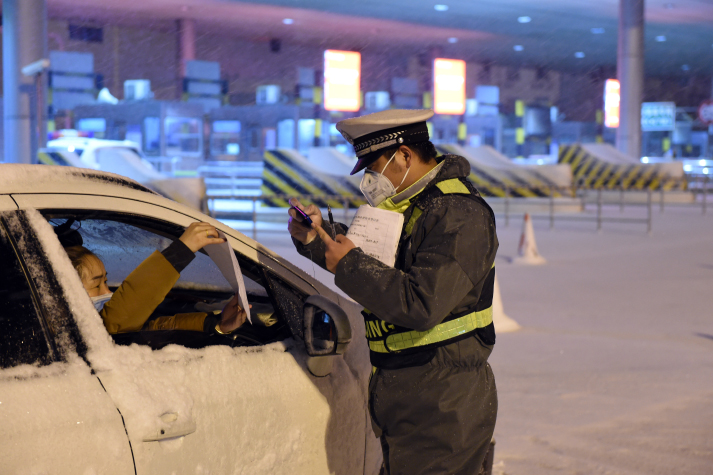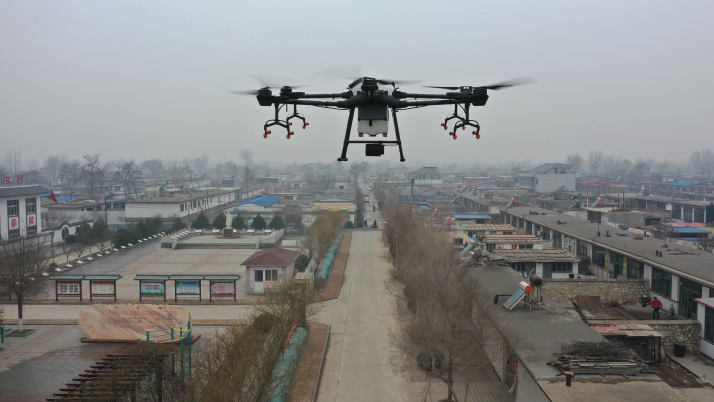| Opinion |
| China Responds | |
| The Chinese Government shows its transparency and effectiveness in the fight against the epidemic | |
|
|
 A police officer records a person's car information at a toll station in Hefei, Anhui Province in east China, on February 15 (XINHUA)
Faced with a spreading epidemic, China's Central Government responded with greater speed and transparency than during the severe acute respiratory syndrome (SARS) epidemic in 2003. Unlike the SARS epidemic, when the nation was criticized for withholding early warning information that delayed effective response efforts, the central authorities have handled the novel coronavirus emergency in a much more systematically effective manner. Transparent efforts Some claim that China has been less than forthright and has lacked in transparency. If that were really the case, then the epidemic would have been relegated to mere rumor, and allowed to run unchecked and unreported. That has not been evidenced. Once the sheer scale of the epidemic became apparent, the Chinese Government's response to the outbreak was swift. Chinese media began publicizing information regarding the then-unexplained viral outbreak as early as December 31, 2019, only a couple of weeks after the first case was reported. Chinese authorities also shared the virus' genetic sequence in early January to support the diagnosis of potential patients around the world, as well as aid in the creation of vaccines against the virus. The first evidence of the virus emerged in December 2019 and authorities went public with it in January. Simply stated, there has been institutional learning on the part of the state. Was it perfect learning? Of course not. An evolving emergency typically creates an environment that initially tends to foster imperfect learning. That said, scholarly work in disaster and crisis management tells us that the learning curve rapidly improves with robust information, field experience and the rapid deployment of assets. During the current epidemic, China has demonstrated better learning than it had during SARS. China has no reason to fabricate coronavirus case numbers when the nation's political and economic survival literally depends on properly eradicating the disease. Governments, irrespective of political system, still have to govern. China is no different. It still has to run a country and attempt to be successful. Therefore, real statistics and insights matter. To dismiss the numbers at face value is intentionally naïve. The idea that China would completely fabricate case numbers when the spread of the disease could threaten the nation's social stability and the government's legitimacy is ludicrous. There may be some methodological shortcomings or critiques, but people must realize that China has an interest in getting this right. It has made great efforts to refute the assumption that information coming from China cannot be relied upon. Not only are official updates of current figures regularly published, the World Health Organization has stated that the Chinese Government is committed to preventing the epidemic and cooperating with other countries on the issue. Even U.S. President Donald Trump and Vice President Mike Pence, neither close friends of China, have praised the country for both its efforts and transparency. Yes, mistakes were made, as they always are at the onset of a rapidly evolving emergency. This does not excuse those mistakes, particularly ones made early on by local authorities in Wuhan and Hubei Province where it is clear that local officials in Wuhan could have, and should have, reacted much earlier.  A drone sprays disinfectants over a village in Luanzhou, Hebei Province in north China, on February 14, as part of local epidemic control efforts (XINHUA)
Effective action Millions of Chinese were confined to their homes as part of epidemic prevention efforts. They had to make daily calculations about how and when to go out to find food and other necessities in order to keep themselves and their families out of harm's way. Many heroic individuals have made tremendous sacrifices on behalf of their nation and their fellow citizens. And the Chinese Government has engaged in the herculean task of temporarily shelving portions of the country's economy to prevent the further spread of the virus. If China had quarantined Wuhan and not quarantined other areas of the nation, the world would have likely reacted to this negatively, condemning China for not being sufficiently serious or attentive. However, we know that this was not the case. China acted decisively. While there may be a debate as to how perfect the strategy has been, China has demonstrated that it is capable of enacting powerful and prompt quarantine measures to prevent the spread of infection. Rapidly addressing the emergency at the national level, the Central Leading Group on Responding to the Novel Coronavirus Pneumonia Outbreak, chaired by Premier Li Keqiang, was established on January 25 during a meeting of the Standing Committee of the Political Bureau of the Communist Party of China (CPC) Central Committee. Two days later, Li arrived in Wuhan to guide the epidemic control work in Hubei. Despite the extreme complexities of the epidemic, the outbreak has exposed some deficiencies in China's current early warning mechanisms for major events such as public health emergencies. These concerns relate to issues of the national governance system and governance capability that were raised by President Xi Jinping and emphasized in the Fourth Plenary Session of the 19th CPC Central Committee in October 2019. There are more than enough reasons to believe that the series of decisive actions taken by the government during the past few weeks to address the epidemic have helped fight the virus and gradually end the emergency. Just as important, based on what has been lost and gained in this process it will serve to further implement and realize China's goals of modernizing its national governance system and governance capability. The outbreak of the virus has shaken China and has raised concerns around the world. Nevertheless, it is similar to challenges that China has faced before. China will control and mitigate this virus soon enough thanks to the efforts of both Chinese researchers and those from around the world. The Chinese people have shown remarkable solidarity, courage and dedication. It cannot and must not be seen through the lens of a science fiction movie or politicized cheap shots by certain commentators that result in unnecessary panic, turmoil and distrust. The author is chair of the Department of Political Science and Geography and professor of political science at the University of Texas at San Antonio Copyedited by Rebeca Toledo Comments to yanwei@bjreview.com |
|
||||||||||||||||||||||||||||||
|
